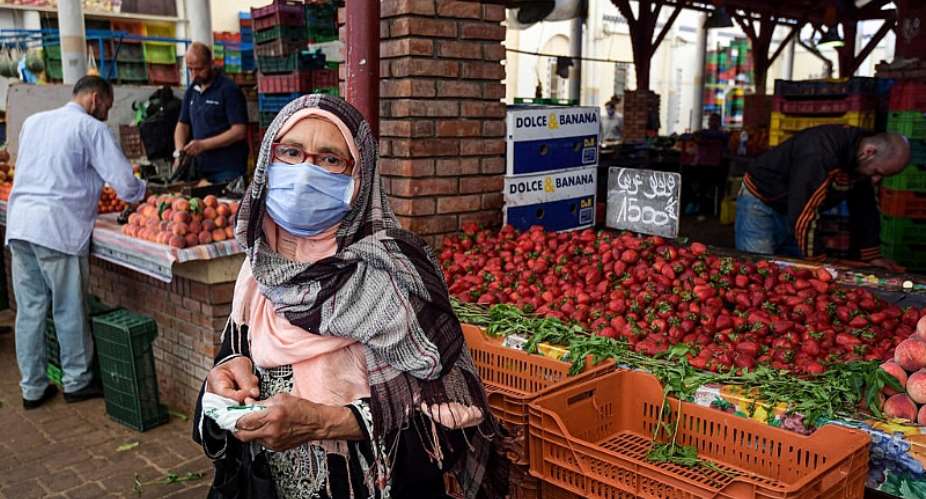One of the most important events in the Muslim calendar, Eid-al-Fitr marks the end of the holy month of Ramadan. Traditionally celebrated with mosque prayers and family feasts, Covid-19 has cast a long shadow over festivities this year.
In France, a country with the fifth-largest number of Covid-19 related deaths, Eïd el-Fitr is to be celebrated on Sunday, after 29 days of fasting during the holy month of Ramadan.
This comes a day after a government decision allowing people to take part in religious ceremonies.
But French Muslim religious authorities called on people to be careful and refrain from going to mosques for prayer on Sunday.
One exception to this was in the Paris suburb of Levallois-Perret, where over 2,000 Muslims gathered in a sports field on Sunday.
According to a France Info journalist at the scene, the worshippers respected distances of at least one metre between each person.
Meanwhile, elsewhere in the world, countries took precautions for the Eid celebrations.
Saudi Arabia, home to Islam's holiest sites, began a five-day, round-the-clock curfew from Saturday after infections more than quadrupled since the start of Ramadan to around 68,000 -- the highest in the Gulf.
Eid prayers are being held at the two holy mosques in the cities of Mecca and Medina "without worshippers", authorities said on Saturday, citing a royal decree.
Mecca's Grand Mosque has been almost devoid of worshippers since March, with a stunning emptiness enveloping the sacred Kaaba -- a large cube-shaped structure towards which Muslims around the world pray.
Temperature checks
Jerusalem's Al-Aqsa mosque, Islam's third holiest site, will reopen to worshippers only after Eid, its governing body said.
In Lebanon, the highest Sunni religious authority has announced the reopening of mosques only for Friday prayers. Worshippers, however, will be subject to temperature checks and sanitary controls before they enter.
Meanwhile, Muslims across Asia, from Indonesia to Pakistan, Malaysia and Afghanistan, thronged markets for pre-festival shopping, flouting coronavirus guidelines and sometimes even police attempts to disperse large crowds.
Fake travel documents
Pakistan, which gave into religious pressure by allowing mosque prayers throughout the fasting of Ramadan, is yet to decide over mass gatherings during Eid.
In Indonesia, the world's most populous Muslim nation, people are turning to smugglers and fake travel documents to get around bans on the annual end-of-Ramadan travel that could send infections soaring.
More than 3,500 Tunisians who travelled home just ahead of the holiday will have to spend it away from their families, forced to quarantine for two weeks in hotels after arriving from abroad.
The Covid-19 death tolls across the Middle East and Asia have been lower than in Europe and the United States, but numbers are rising steadily, sparking fears the virus may overwhelm often underfunded healthcare systems.
Iran, which has experienced the Middle East's deadliest outbreak, has called on its citizens to avoid travel during Eid as it battles to control infection rates.
New peaks of the disease
Iran shut schools and places of worship and banned inter-city travel for the Persian New Year holidays in March, but the restrictions were recently eased.
Health Minister Saeed Namaki said that the country was focusing hard on avoiding "new peaks of the disease" caused by people "not respecting health regulations".
The exact date of Eid has yet to be set in the Shiite-majority country, but will likely be Monday, in line with the Shiite community's celebrations in Iraq, as announced by top cleric Grand Ayatollah Ali Sistani.
(With AFP)





 We’ll protect state wealth from opaque deals – Prof Jane Naana
We’ll protect state wealth from opaque deals – Prof Jane Naana
 Mauritania president says running for second term in June polls
Mauritania president says running for second term in June polls
 I won't ever say I was a mere driver’s mate' — Prof. Opoku-Agyemang
I won't ever say I was a mere driver’s mate' — Prof. Opoku-Agyemang
 2024 polls: 'EC struggling to defend credibility'— Prof. Opoku-Agyemang
2024 polls: 'EC struggling to defend credibility'— Prof. Opoku-Agyemang
 Akufo-Addo gov't's 'greed, unbridled arrogance, unrestrained impunity, sheer dis...
Akufo-Addo gov't's 'greed, unbridled arrogance, unrestrained impunity, sheer dis...
 Election 2024: Ghana needs an urgent reset, a leadership that is inspiring – Ma...
Election 2024: Ghana needs an urgent reset, a leadership that is inspiring – Ma...
 Partner NDC to rollout a future of limitless prospects – Prof Jane Naana Opoku-A...
Partner NDC to rollout a future of limitless prospects – Prof Jane Naana Opoku-A...
 NPP will remain in gov’t till Jesus comes — Diana Asamoah
NPP will remain in gov’t till Jesus comes — Diana Asamoah
 Sunyani Technical University demands apology from former SRC president over sex-...
Sunyani Technical University demands apology from former SRC president over sex-...
 'Dumsor' was resolved by Mahama but ‘incompetent' Akufo-Addo has destroyed the g...
'Dumsor' was resolved by Mahama but ‘incompetent' Akufo-Addo has destroyed the g...
